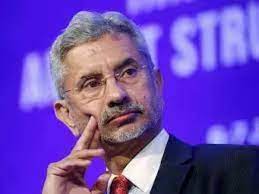BANGKOK, Aug 17: A country’s soft power reflects the creative urges of its society and the Government can help only in advancing that, External Affairs Minister S Jaishankar has said as he highlighted India’s efforts to promote millets, ayurveda, yoga and forms of traditional medicine globally to exert more of the country’s soft power.
Jaishankar, who arrived here on Tuesday to attend the 9th India-Thailand Joint Commission Meeting, took part in an event where he met members of the Indian community.
Responding to a 16-year-old fourth-generation Thai-Indian girl’s question, Jaishankar said: “It is a very society-driven activity. The beauty of soft power is that it is soft as it is not driven by the government. It reflects the creative urges of society.”
“Certainly, the Government can enable it more and one of its examples is the International Day of Yoga,” he said.
He said the Gulf, North Africa and Central Asia are parts of the world where probably the Indian soft power is the strongest as culturally people identify more readily.
“Until 2014, it was not that people did not do yoga abroad. But once (Prime Minister Narendra) Modi ji got this inspiration that we must make it an international celebration,” he said, adding then a resolution was passed in the UN unanimously to declare it the International Day of Yoga.
Jaishankar said he thinks today the International Yoga Day is the single day that has the largest cultural celebrations in the world.
“It should be an inspiration to us to do more,” he said.
“Today we are energetically promoting ayurveda and forms of traditional medicine,” he said, adding the World Health Organisation has just set up the first global centre of traditional medicines in India’s Jamnagar.
“COVID-19 has made people much more aware of traditional medicines,” he said.
Giving an example, Jaishankar said there will now be the International Year of Millets.
“Some of you may remember eating millets in your youth. Now everybody has switched to rice and wheat. If you look at what our parents and grandparents ate, almost all of them ate millet,” he said.
Millets are very healthy, they are far more nutritious, and they require much less water, and today when you look at food shortages. Millets can make a huge difference, Jaishankar said.
Promoting millets is also an example of soft power as you change people’s eating styles, he said.
It is certainly better than promoting potato chips, he added, drawing laughter from the audience.
On another question about what India is doing to bring its universities on par with foreign varsities, he said: “We are very conscious that Indian universities need an upgrade, a massive upgrade.”
“We want much deeper collaboration with foreign universities, we want more foreign students. We want our universities among the top universities up there,” he said.
Giving an example of sports, he said that once there was a determination in the country that “we must do better in sports, we must support sports people and we must give them facilities”, non-cricket sports took off very well.
“We want that to happen in education. There is a policy and Education Minister who is very dynamic, he is working on how to make this happen. You are going to see very big changes in that space, changes for the better,” he added.
According to QS World University Rankings released in June, 2022, the coveted global ranking for education institutions, a total of 41 Indian universities figured in the top 200 list while no Indian university was listed in the top 100. (PTI)
Trending Now
E-Paper


